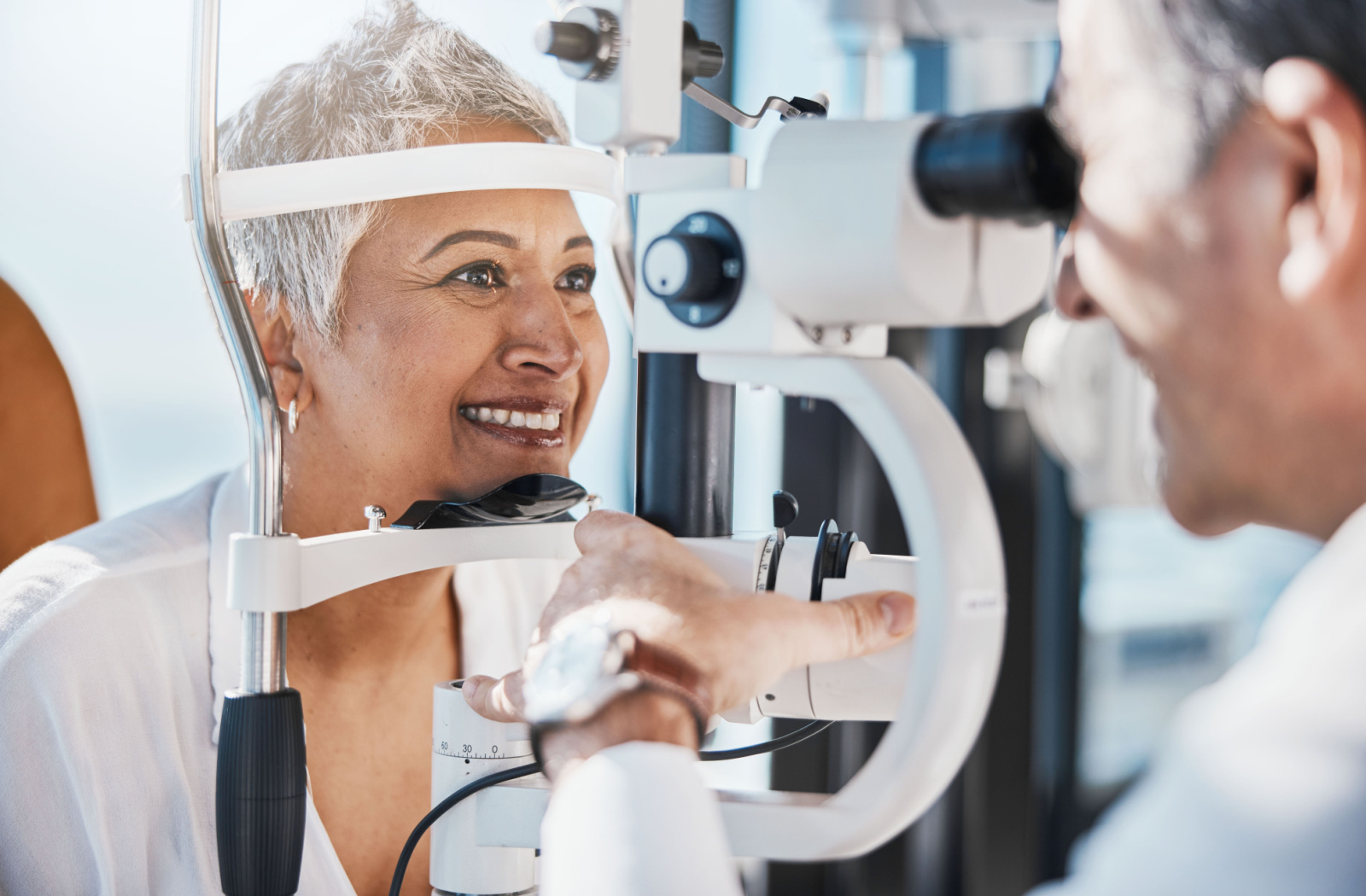If you’ve been thinking about undergoing LASIK surgery but are worried you cannot because you have astigmatism, don’t despair. Many people with astigmatism have successfully undergone LASIK and achieved clearer vision. But there are some considerations, and not everyone with astigmatism is a candidate for LASIK.
Fortunately, your optometrist can help. With consultations and eye exams, they can guide you toward an informed decision about whether LASIK surgery is right for you.
What Is Astigmatism?
Astigmatism is one of the various types of vision problems people experience, collectively known as refractive errors. These eye conditions affect how light enters the eye and forms images on the retina, a layer of light-reactive cells at the back of the eye. Nearsightedness and farsightedness are 2 common refractive errors you may have heard of.
If you have astigmatism, your eyes may struggle to focus light rays evenly onto your retina. This is because the front dome of your eye—called the cornea—or the lens inside, is slightly irregular in shape. Imagine your eye is a nice, round basketball. With astigmatism, it’s shaped more like a football. The more astigmatism, the more football-like it is. This results in blurred and distorted vision.
Most people have some level of astigmatism, but in severe cases, it can cause blurred or distorted vision at all distances. You could even have it in conjunction with other refractive errors.
Am I a Candidate for LASIK?
It’s a common misconception that people with astigmatism can’t benefit from LASIK. While there are requirements for LASIK (or any laser eye surgery, for that matter), simply having astigmatism won’t exclude you from being considered.
Good candidates for LASIK should:
- Be 18 or older at minimum, ( ideally 21 years or older)
- Have an eye prescription that hasn’t changed much recently
- Have healthy corneas that are thick enough for surgery
- Have good overall eye health
- Have realistic expectations about LASIK outcomes
LASIK can correct nearsightedness, farsightedness, and astigmatism, but not every person is a good candidate for laser eye surgery. Conditions that may mean you’re not a good candidate for LASIK include:
- Unstable prescriptions
- Extreme amounts of nearsightedness, farsightedness, or astigmatism
- Severe dry eye
- Thin corneas
- Corneal scarring or disease
- Keratoconus (a bulging cornea)
- Advanced glaucoma
- Cataracts
- A history of eye infections
- Uncontrolled diabetes
Sometimes, dealing with one of these conditions first means you’ll be able to receive the benefits of LASIK. Still, you’ll need to work with your optometrist to determine if that’s possible.
What Happens During a Laser Eye Surgery Consultation?
One of the most crucial steps during your consultation is a comprehensive eye exam. This is where your optometrist can determine not only your prescription but also the health of your eyes. It’s a chance to look for the signs that indicate you’ll be a good candidate for surgery.
Your optometrist will likely also discuss your medical history, including any relevant conditions you have or medications you are taking. You may also discuss the surgery’s long-term results and associated risks and benefits.
The consultation can also help you decide if laser surgery is the right choice for your lifestyle. Your optometrist can discuss in detail what the procedure entails. The surgeon will want to understand your expectations and desired outcome from the surgery, as well as any questions or concerns you may have.
What About Other Techniques?
There are different types of laser eye surgery techniques, including PRK. If you’re not a LASIK candidate, it’s possible that another option may work better for you. For example, PRK may be preferable if you have thin corneas. It all comes down to your unique situation. All the more reason to have an initial consultation to discuss the future of your vision.
Benefits of Laser Vision Correction
Laser eye surgery has numerous benefits that go beyond simply improved vision. Patients can also benefit from:
- Freedom from glasses and contacts: No more worrying about losing your glasses or carrying around contact solution! While you may still have to wear glasses during certain activities, such as night driving or reading, you can usually say goodbye to corrective lenses.
- High success rate: Laser vision correction can improve your overall vision significantly. In fact, 90% of people who have LASIK end up with vision between 20/20 and 20/40.
- Convenience: Laser vision correction can be a surprisingly quick surgery. It usually takes less than 30 minutes, and you’ll probably need to rest your eyes for 1–2 weeks. Your surgeon can take you through post-care instructions to give your eyes plenty of relaxation as they heal.
- Potential long-term savings: While laser vision correction is an upfront investment, it could save you money in the long run. Over time, the cost of new glasses and replacing contacts can add up. With laser vision correction, you may only need to pay once to enjoy clear vision for years to come.

Your Local Guides in Orangeville for LASIK & Beyond
LASIK surgery can be an effective option for people with astigmatism who want to improve their vision. However, not everyone with astigmatism will be a good candidate for the procedure, and it’s essential to have a thorough evaluation by an optometrist to determine if LASIK is the right option for you.
If you’re considering LASIK surgery, the team at Headwaters Optometry can help you carefully weigh the benefits and risks with our laser eye surgery consultations. With the right information and guidance, LASIK surgery can be a safe, effective way to achieve sharp vision and enjoy life without glasses or contact lenses.Stop wondering and start learning—book your consultation today!




